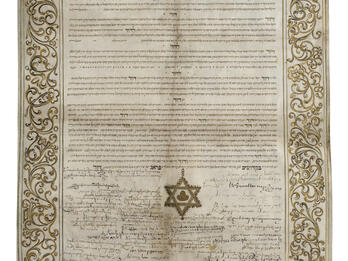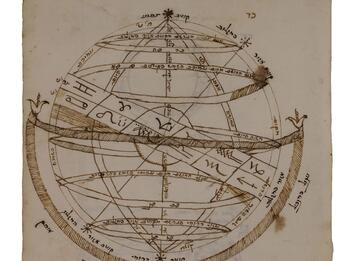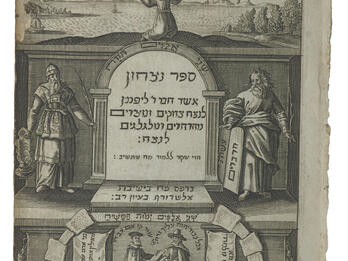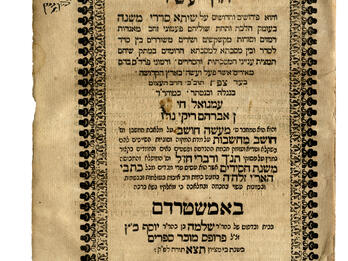Commentary: On the Jerusalem Talmud
Elijah Fulda
1710
With a brief commentary and some Tosafot (additions) which were balanced, refined, and written by the Torah scholar, the great rabbi, R. Elijah ben Judah Loeb, who dwells in the land of Fulda, based on the Tosefta, the Mekhilta, Sifra, the Sifrei, the sea of the Talmud, and the works of the earlier geonim, as the eye of the reader will see:
And the…
This text is from the frontispiece of Fulda’s commentary to the Talmud Yerushalmi, which was compiled by his students and published in his name.

Related Guide
Early Modern Rabbis and Intellectuals on the Move
Carrying books and knowledge, itinerant rabbis and scholars traveled between communities, facilitating cultural exchange.

Related Guide
Education and Scholarship
The early modern period featured educational reforms, anti-Christian polemics, and growing Jewish university participation.
Creator Bio
Elijah Fulda
Little is known about Elijah Fulda, the first Ashkenazic scholar to write a commentary on the Palestinian Talmud. Elijah, who was born and died in Wiznica, Poland, spent time in Fulda, Germany. Scholars suggest that he traveled to Germany and Amsterdam to print his works; some claim that he served as rabbi of Fulda, although there is no written evidence of this. Based on the approbation for his commentary by David Oppenheim of Prague (1709), we know that Elijah had studied with Oppenheim twenty years previously (ca. 1689/90). Elijah’s commentary on the Palestinian Talmud constituted a turning point in the attitude toward this text—which had previously been overlooked by Ashkenazic scholars—and marked the beginning of its methodical study in Eastern Europe. Elijah’s detailed commentaries and novellae on the Order of Zera‘im (Seeds), and the tractates of Shekalim, Bava Kamma, Bava Meẓi‘a, and Bava Batra (and perhaps others, although only these have survived) influenced his contemporaries, as well as future generations of scholars. Among the major rabbinic figures who wrote approbations for his commentaries (in addition to Oppenheim) were notable rabbis from Amsterdam, including ḥakham Zevi and Solomon Ayalon.
You may also like
Tosafot Yom Tov (The Additions of Yom Tov)

Yom Tov Lipmann Mühlhausen’s Sefer ha-nitsaḥon
‘Ets ḥayim (Tree of Life)
Shirat dodi (Song of My Beloved)



